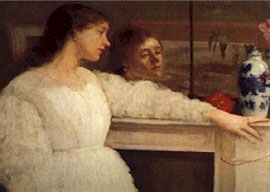
May 05, 2011

Each sentence seems to declare that life, which is everything outside of love and art, is wholly inadequate to a sensitive soul’s needs. Sounds like romanticism to me.
“Flaubert is holding up a mirror to the middle- and lower-middle-class world of his day,” Davis informs us in the introduction. Sure, but when the mirror is as dirty as the thing it reflects, what can you possibly see? Dirty and tear-stained, for there must be pathos! Flaubert wanted them to cry. He wanted to write about contemptible people and wanted the public to be moved by it. Did he not notice that people tend to see their own tears as holy water, sanctifying the object for which they were shed? He wanted to take a common subject and make it poetic. Why? Just to show that it can be done? In his elevation of style above all else, Flaubert underestimated art’s power. For it may be that fiction doesn’t so much foreshadow as influence what is to come, that Madame Bovary as the prototypical 21st-century consumer is not “strikingly prescient” but unfortunately influential. Emma Bovary is a common hussy, yes, but she is also a heroine. Placed on a novel’s pedestal, people will look up to see her.
Returning from an escapade with her lover, Emma is confronted by creditors. Frantic for money, she runs to the notary (who disgusts her) and the tax collector (who refuses her). Then she remembers her first lover Rodolphe and turns on the waterworks. She gets him to profess his eternal love before springing on him that she needs three thousand francs. He refuses. She crams arsenic in her mouth. And all through this we hear how beautiful she is when distraught”even more beautiful than before because she’s more passionate! Lust for money and the frantic thrashings of a trapped animal. Beautiful.
A shortsighted pleasure-seeker slowly heading to her own destruction; a silly, shallow liar wreaking havoc around her, for if she’s going down, she’s taking everyone with her. Beautiful, beautiful. Such an alluring example that it is now emulated not only by bored housewives but by entire nations.
We are asked to spend hours in Emma Bovary’s stultifying company on the subway, in bed, turning the pages to get to the end. She is pretty, so we do it. And everyone is in love with her…Charles and Rodolphe and Leon…Mario Vargas Llosa, Vladimir Nabokov, Julian Barnes, and Philippe Sollers. When they write about her, the page is still moist from their drool. She’s vulgar, they admit, but so vivacious. The shallowness is part of her appeal, right along with the senseless craving and the promise of violence. It combines to give a good imitation of a richer life, of greater sensitivity. But Emma doesn”t feel more, she just wants more, though whatever you give her will never be enough and you will always get blamed for her petty dissatisfaction.
Bref, she’s the bottomless hole, the typical bitch. So why do men like her so much? Beats me!